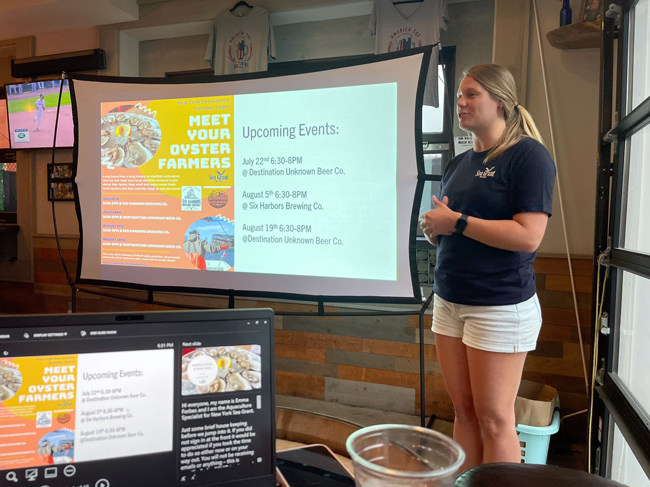
Emma Forbes, New York Sea Grant's Aquaculture Specialist, coordinated a "Meet Your Oyster Farmers" event series throughout Summer 2021.
Contacts:
Emma Forbes, Aquaculture Specialist, New York Sea Grant, E: ef372@cornell.edu
Antoinette Clemetson, Marine Fisheries Specialist, New York Sea Grant, E: aoc5@cornell.edu
Want the latest on aquaculture information, resources and events? Join the New York Sea Grant Aquaculture Listserv.
Elmsford, NY, April 29, 2022 - For over a century, aquaculture farmers have been cultivating both marine and freshwater fish, shellfish, and aquatic plants for food, stocking, restoration and fee-fishing throughout the state of New York. With New York’s diverse coasts, including the Great Lakes, the Atlantic Ocean, numerous large rivers and estuaries, there are many opportunities to grow and expand the small but important aquaculture industry that exists today.
When done properly, aquaculture is a sustainable and responsible way to grow aquatic plants and animals. Aquaculture not only produces seafood, but it also can help restore ecosystems with the rebuilding of wild stocks.
"With many fisheries at their max, and the demand for seafood increasing with a growing population, aquaculture can help fill in the gaps, providing food security, economic growth, and sustainability for wild stocks," said Emma Forbes, New York Sea Grant's (NYSG) Aquaculture Specialist. "That is why aquaculture education in New York is so important for people to understand what it is truly all about."
By providing accessible opportunities and resources, NYSG is hoping to encourage the growth of a successful and sustainable aquaculture industry throughout the state.
New York Aquaculture Fact Sheet
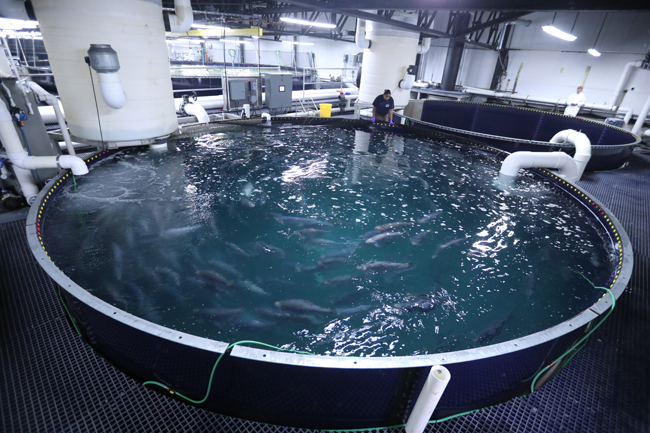
Commercial scale recirculating system culturing steelhead trout. Credit: John Ng/Hudson Valley Fisheries.
Among the many efforts that Forbes is doing to further educate and engage New Yorkers, a New York Aquaculture fact sheet (pdf) was developed to provide quick facts about the industry and address the current status of aquaculture in New York State.
The fact sheet includes a general overview about aquaculture and shellfish aquaculture, uses of aquaculture in New York State, and the different methods for growing aquaculture products.
This fact sheet is a resource for NYSG to share and disseminate information to stakeholders. Aquaculture may be a newer, more far-removed concept to many. Anyone from teachers, entrepreneurs, to the general public can obtain a snapshot about aquaculture with access to this helpful fact sheet. The more people learn about aquaculture, the more the industry will be able to thrive in New York’s communities.
Shellfish Farming E-Course
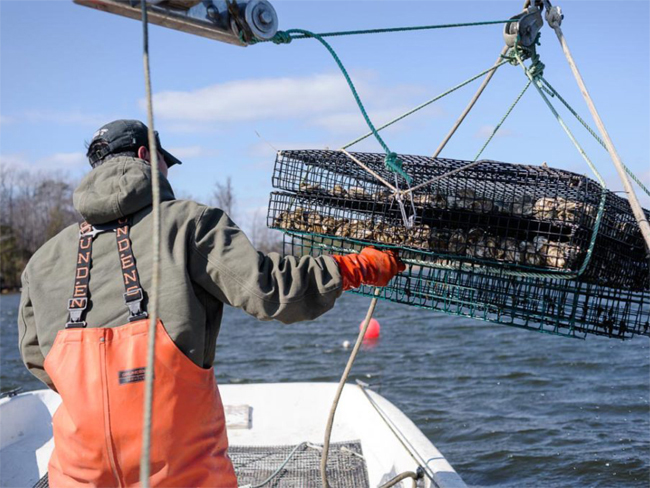
Since last summer, NYSG and Cornell Cooperative Extension have been administering "Is Shellfish Farming Right For You?," a free online course to help those that are new to shellfish aquaculture and are interested in starting a business venture.
Funded by the National Oceanic and Atmospheric Administration (NOAA) via the National Sea Grant Program, the shellfish farming e-course is organized into two parts:
Part one is all about helping prospective investors to understand if this industry is something that they want to pursue. There are many different permits issued by multiple agencies that are needed, and there are many different components to shellfish farming. Done at your own pace, this course highlights permitting, leasing programs, basic farm operations and management.
Part two is a one-day workshop that offers an in-person training opportunity.
“The journey to obtaining a shellfish license in New York State is very complicated – that’s why NYSG and our partners developed this e-course for individuals who are interested in shellfish farming. It is a great guide to help you decide if this industry is right for you,” said Antoinette Clemetson, New York Sea Grant’s Marine Fisheries Specialist.
Questions? Please contact shellfishfarming@cornell.edu.
Great Lakes Fish Finder
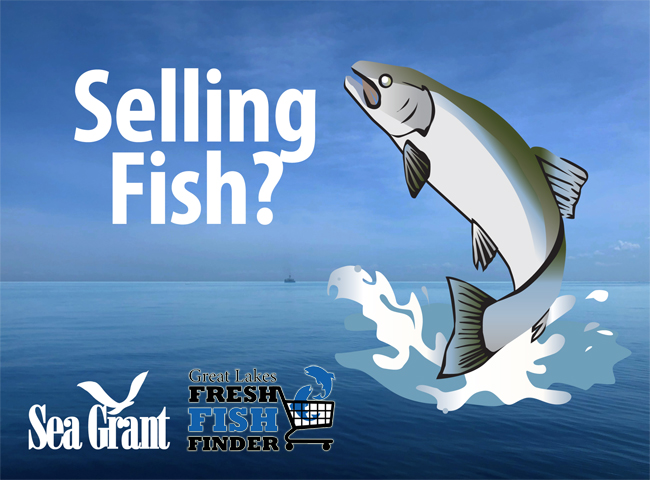
Illustration Credit: Joel Davenport.
Do you sell fish? The Great Lakes Sea Grant Network invites you to join Great Lakes Fresh Fish Finder: www.freshfishfinder.org. This webpage is designed for consumers to find locally sold fish, including bait fish, fish for stocking, consumption, and fee-fishing. Great Lakes Fresh Fish Finder will help producers access new markets and be easily searchable for interested consumers.
This platform is managed by Sea Grant and is FREE to join and use! Each participating business will have their business name, location (optional), product available, website, contact information, and description included
Great Lakes Aquaculture Collaborative
In early Fall 2021, The Great Lakes Aquaculture Collaborative, a project of Great Lakes Sea Grant Network programs, launched six virtual aquaculture farm tours.
As part of 2021 Great Lakes Aquaculture Days, Sea Grant programs from around the region provided virtual aquaculture farm tours and interviews with aquaculture farmer.
New York Sea Grant hosted a virtual tour of Hickling's Fish Farm, a family owned and operated business that has been supplying fish for stocking and wholesale since 1986. Hickling's is located in Edmeston, NY, which is about 18 miles west of Cooperstown and approximately 35 miles south of Utica.
Great Lakes Aquaculture Days, which ran from August 31st - September 2nd, are hosted by the Great Lakes Aquaculture Collaborative, a federally funded network of scientists, educators, communicators and outreach specialists that support aquaculture in the Great Lakes.
Other regional tours, each which highlights a different type of aquaculture system and business model, can be found in the playlist.
More at www.greatlakesseagrant.com/aquaculture.
NYS Wine and Seafood Event
As last October's #NationalSeafoodMonth came to a close, New York Sea Grant joined some partners — Cornell Cooperative Extension of Nassau County; NYS Grown & Certified; Long Island Welcome Center; Taste NY — for "New York State Wine and Seafood," a special event prepared by Chef Craig Attwood at Five Ocean Bar & Grill in Long Beach, NY
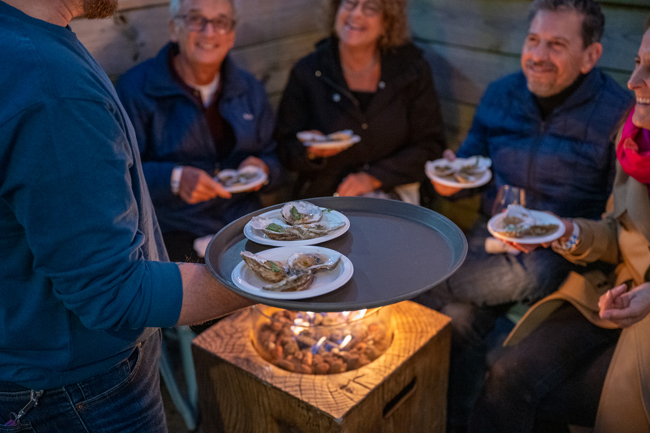
Credit: R.J. Anderson, Cornell Cooperative Extension.
“The seafood showcased was a combination of New York grown aquaculture products and wild caught seafood," said Forbes. "When most people think of seafood in New York, they imagine fishing or digging for clams in Long Island, but New York has much more to offer."
At the event, attendees were served New York Grown and Certified steelhead trout from Hudson Valley Fisheries, salmon from Local Coho and cultured oysters from Peeko Oysters.
These palate pleasers were paired with Long Island wines from Macari Wines, Sparkling Pointe Vineyards and Winery, and Paumanok Vineyards.
"This event was a great opportunity to pair both wild caught seafood alongside aquaculture products to highlight that both industries can thrive alongside each other to meet the growing demand for seafood," said Forbes.
"Meet Your Oyster Farmers" Event Series
Last July and August, Forbes coordinated a "Meet Your Oyster Farmers" event series to engage and educate Long Island’s communities about their local oyster farmers.
"With education, we can inspire an expansion of the aquaculture industry across the state and give back by helping to support the farmers who already support our communities and our local waters," said Forbes.
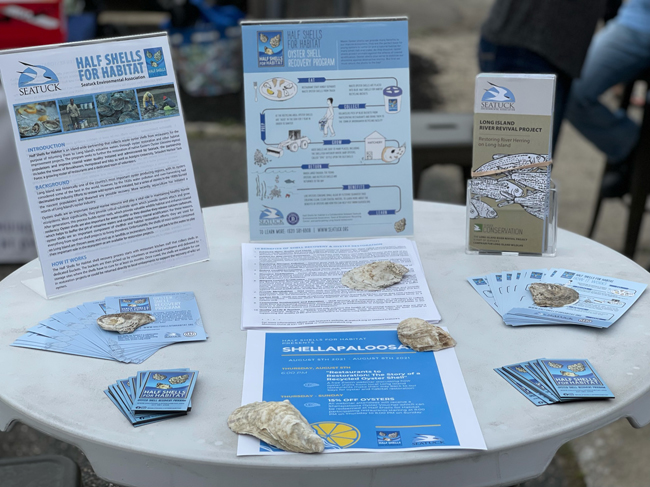
During the summer series' four events — two at the Six Harbors Brewing Co. in Huntington, NY and two at the Destination Unknown Beer Co. in Bayshore, NY — NYSG engaged approximately 100 community members and hosted a variety of farmers and aquaculture professionals, including: The Gino Macchio Foundation; Little A’s Oysters; Christopher Brianik of Stony Brook University (triploid oyster research); The Neguntatogue Project; Fitall Shellfish; SEATUCK Environmental Association (Half Shells for Habitat); Shellworks; Shamrock Oyster Company; and Scrimshaw Oysters.
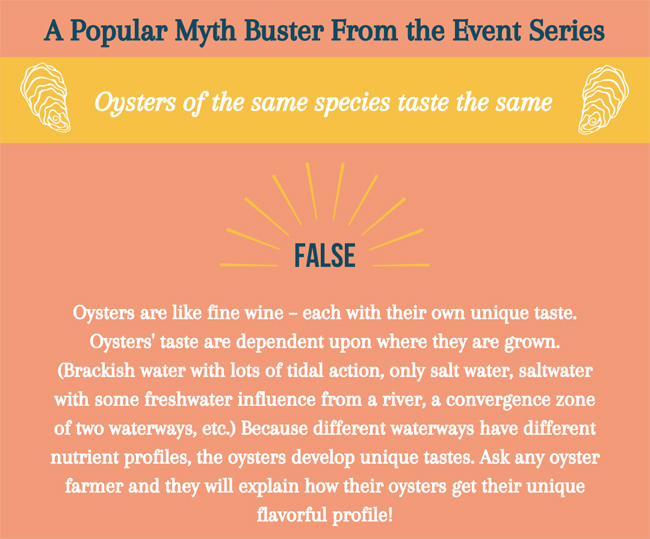
Once people had settled in with their beers and oysters, NYSG kicked-off each event with an aquaculture history talk to set the scene. Then, a trivia game engaged the audience with challenging questions about aquaculture. This “myth buster” session was a nice way to introduce the main event.
Oyster farmers then took center stage to talk about their oyster farming business – diving into how and why they began, the various growing methods they use, and the differences between tastes in oysters depending on where they are from and how they are raised. Attendees also learned that oyster farmers do not just grow oysters for profit, they also donate to restoration projects. Bivalve mollusks like oysters are filter feeders, making them powerful allies in helping to clean New York’s waterways. As oysters feed, they filter pollutants like excess nutrients in the water. When connected as an oyster reef, they can also help to protect shorelines and stabilize areas from erosion.
"The purpose of this series was to educate Long Island communities about aquaculture, but it was also to help bring a face to the industry. Firefighters, former Peace Corps workers, family businesses - these are our oyster farmers. We were fortunate to have passionate oyster farmers present at the event and enthusiastic attendees," said Forbes.
For more the "Meet Your Oyster Farmer" series, see a March 2022 one-pager (pdf).
More Info: New York Sea Grant
New York Sea Grant (NYSG), a cooperative program of Cornell University and the State University of New York (SUNY), is one of 34 university-based programs under the National Oceanic and Atmospheric Administration’s National Sea Grant College Program.
Since 1971, NYSG has represented a statewide network of integrated research, education and extension services promoting coastal community economic vitality, environmental sustainability and citizen awareness and understanding about the State’s marine and Great Lakes resources.
Through NYSG’s efforts, the combined talents of university scientists and extension specialists help develop and transfer science-based information to many coastal user groups—businesses and industries, federal, state and local government decision-makers and agency managers, educators, the media and the interested public.
The program maintains Great Lakes offices at Cornell University, University at Buffalo, SUNY Oswego and the Wayne County Cooperative Extension office in Newark. In the State's marine waters, NYSG has offices at Stony Brook University and Cornell Cooperative Extension of Nassau County on Long Island; at Brooklyn College, with New York City Department of Environmental Protection in Queens and at Cornell Cooperative Extension in NYC and Elmsford and Kingston in the Hudson Valley.
For updates on Sea Grant activities: www.nyseagrant.org has RSS, Facebook, Twitter, Instagram, and YouTube links. NYSG offers a free e-list sign up via www.nyseagrant.org/nycoastlines for its flagship publication, NY Coastlines/Currents, which is published quarterly.